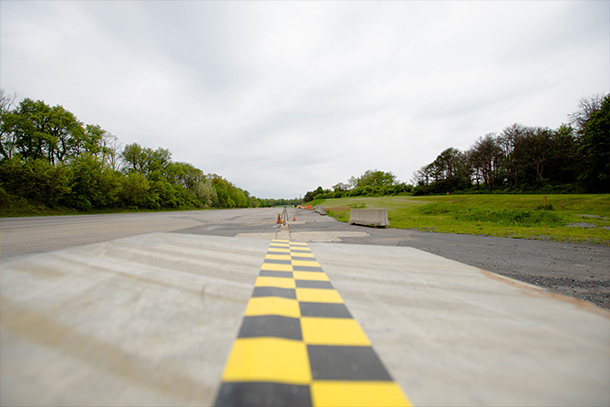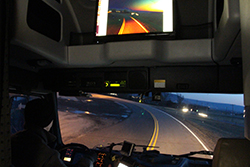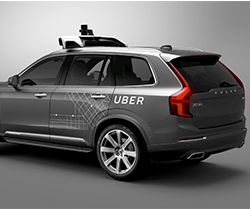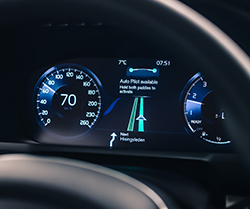
The Larson Institute's full-scale Transportation Research Facilities include a test track facility designed to accommodate a broad range of research activities. The facility features a 1-mile oval, a large vehicle handling area, and a vehicle durability-testing course that allows additional pavement, vehicle, and appurtenance testing. The facility includes a special test section where test surfaces can be installed on a temporary basis for testing.
Automated Vehicle Summit to host vehicle demonstrations at Larson Transportation Institute Test Track
09/06/2017
UNIVERSITY PARK, Pa. – The Thomas D. Larson Pennsylvania Transportation Institute (LTI) is pleased to announce its participation in the 2017 Pennsylvania Automated Vehicle Summit, Sept. 11-12. The two-day event will be held at the Ramada Conference Center, located at 1450 S. Atherton Street in State College and the LTI test track, located at 164 Test Track Road in Bellefonte.
Hosted by The Mid-Atlantic Section of The Institute of Transportation Engineers (MASITE) and the Intelligent Transportation Society of Pennsylvania (ITSPA), the Automated Vehicle Summit is intended for elected and appointed officials, educators, and municipal and regional planners. It is designed to bring together stakeholders to shape the highly automated vehicle (HAV) strategic plan and future legislation, raise awareness of long-term planning considerations and begin preparations for the needs of tomorrow’s workforce. The summit is convened by the Pennsylvania Department of Transportation (PennDOT) and the Pennsylvania Department of Community and Economic Development.
In collaboration with the City of Pittsburgh, LTI was designated as one of 10 federal self-driving vehicle test sites in January 2017.
"LTI has been working diligently with PennDOT and other transportation stakeholders to contribute to the development and research of autonomous vehicles,” said Eric Donnell, professor of civil engineering at Penn State and director of LTI. “This is the first time the LTI test track will be used to host an autonomous vehicle event of this magnitude, so we are really looking forward to the opportunity to connect with so many important decision makers across the region."
The LTI test track offers many of the core capabilities needed to perform connected, automated and autonomous vehicle tests. Perhaps two of the most critical components of these tests are a secure and safe testing environment and the ability to control the test parameters.
"Pavement markings, signage, signal systems, roadway infrastructure and weather are key factors in the development and testing of autonomous and connected vehicles," added Donnell. "Our closed-loop test track at LTI allows our researchers to safely test these things, away from the public."
Existing or planned facilities that the test track offers to support autonomous and connected vehicle testing include:
- An on-site differential GPS system
- A dedicated short-range communication (DSRC) radio network
- Electrification and charging systems
- A vehicle testing laboratory
- A mobile mapping vehicle that can host LIDAR and camera systems with DGPS
A variety of vehicles and vendors will be on hand at the LTI test track between 10 a.m. and noon, Tuesday, Sept. 12, to offer demonstrations of HAV technology. Scheduled autonomous vehicles demonstrations include a test vehicle from Carnegie Mellon University and several demonstrations by Penn State faculty, including a heavy-duty fuel economy estimation and powertrain characterization presentation; real-time six-degrees of freedom map-based vehicle pose estimator, and a highway driving simulator to measure risk acceptance. In addition, Uber is scheduled to have its Volvo XC90 SUV on display.
The Thomas D. Larson Pennsylvania Transportation Institute (larson.psu.edu) is Penn State’s transportation research center. Since its founding in 1968, the Larson Institute has maintained a threefold mission of research, education and service. The Institute brings together top faculty, world-class facilities and enterprising students from across the University in partnership with public and private stakeholders to address critical transportation-related problems.
###
Editor’s note: LTI test track security requires clearance for all visitors. Members of the media interested in attending should contact Danica Laub at dal185@psu.edu to schedule interviews and make necessary arrangements for credentials.
MEDIA CONTACT:
Danica Laub
Phone: 814-863-7925
E-mail: DAL185@engr.psu.edu





